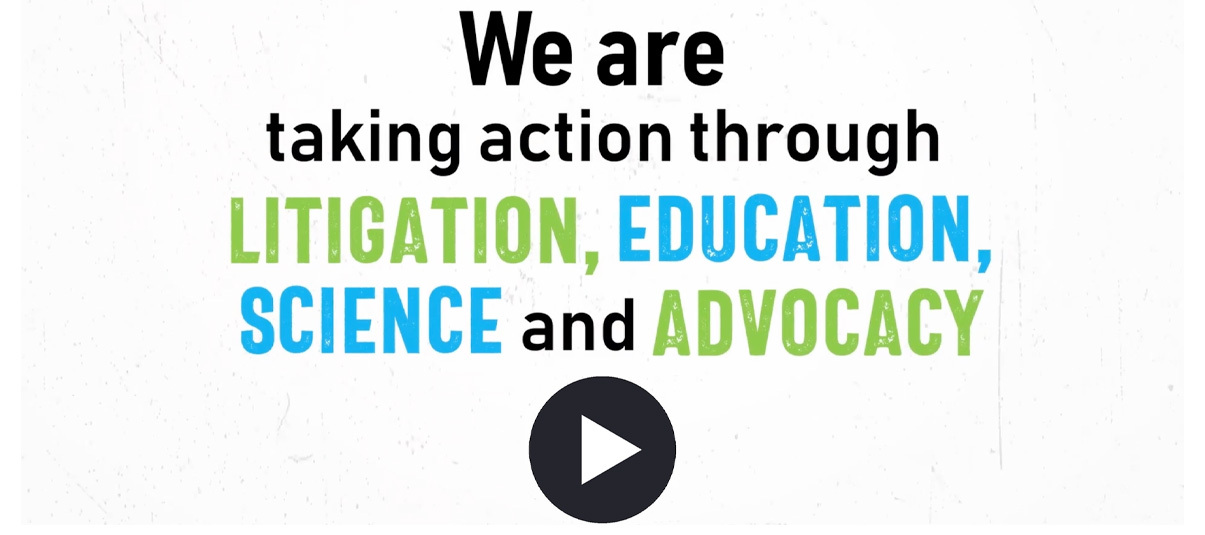Federal Court Rules Canada’s Approval of Glyphosate Product Unreasonable
Renewal of glyphosate-based pesticide product was granted in 2022 without considering new science on potential risks
Environmental and health groups are celebrating a recent ruling from the Federal Court that found Health Canada’s 2022 decision to approve the glyphosate-based herbicide Mad Dog Plus was unreasonable. In their legal challenge, the groups argued that the federal regulatory agency failed to conduct a rigorous, up to date scientific assessment of glyphosate before renewing the product, despite new evidence of potential harms to human health and the environment. Glyphosate is the most heavily used herbicide in Canada and the primary chemical in many products, including Roundup.
The case was brought by Friends of the Earth Canada, the David Suzuki Foundation, Safe Food Matters, and Environmental Defence Canada, represented by Ecojustice lawyers.
New science on the harms of glyphosate have emerged since Health Canada last re-evaluated the health and environmental risks of glyphosate in 2017. The evidence shows there are many risks that should have been considered, including the herbicide’s potential to cause:
- cancer;
- an impact on the microbiome;
- neurodegenerative and reproductive toxicity;
- adverse impacts to pollinators (including monarch butterflies);
- ecological harms to freshwater ecosystems; and
- more frequent forest fires because of increased use of glyphosate in forestry.
Health Canada renewed Mad Dog Plus in December 2022 without updating its assessment of the risks to consider this more recent evidence of harm.
In its decision, the Court noted that Health Canada’s 2022 conclusions that glyphosate-based pesticide products continued to pose acceptable risks was unsubstantiated by any scientific analysis. The Court set aside the renewal of the product, giving Health Canada six months to make a new decision on the renewal that transparently addresses new science on glyphosate risks.
After the hearing of the judicial review, an access to information request revealed that Health Canada planned a review of new glyphosate science in 2022 but proceeded to renew approvals for glyphosate products without completing this review. The planned review was not disclosed to the Court or the public.
The use of glyphosate is widespread in Canada, with an alarming 50 million kilograms per year sprayed on foods and forests. The use of toxic pesticides like glyphosate is on the rise in Canada. A new report from Ecojustice reveals that Canada is now the fifth largest user of pesticides in the world, with sales increasing a staggering 47 per cent in just a decade. These pesticides pose potential harm to the health of humans and the environment.
Laura Bowman, lawyer, Ecojustice said:
“Legislation requires Health Canada to have a full understanding of the potential impacts that risky pesticides, like glyphosate, could have on peoples’ health and the environment before allowing them to be sold and used in Canada. Despite this, Health Canada granted renewals for Mad Dog Plus, a glyphosate-based herbicide, in 2022 without a transparent assessment of new science on risks posed by the chemical.
“This decision from the Federal Court confirms that that Health Canada must keep the science on pesticide risks up to date in order to protect human health and the environment from harm.”
Mary Lou McDonald, President of Safe Food Matters, said:
When renewing a product, Health Canada can no longer rely on old assessments or make the assurance “trust us, we got it right”. In our 2022 case, the Federal Court of Appeal was clear that justification is required. Significantly, this case adds that justification is required at regular checkpoints, like 5-year renewals. Blind deference to Health Canada at any stage of a pesticide’s life-cycle is no longer warranted.”
“Overuse of pesticides, like glyphosate, is a contributing factor in the decline of several species including the threatened monarch butterfly. The PMRA should evaluate new science on effects on species at risk as they reconsider these product renewals in light of the Court decision.”
Background
Canada lags behind other jurisdictions in management of risky pesticides
Canada is the fifth largest pesticide user in the world, with pesticide use and costs to farmers continuing to increase. Canada must identify pesticide use reduction as a clear policy goal and align itself with international best practices to better protect people and the environment. Canada continues to lag behind other jurisdictions in managing the risks posed by these chemicals.
Canada uses millions of kilograms of pesticides that are banned in Europe, and which are linked to serious health and environmental effects. Over-use and poor regulation of pesticides poses serious trade risks for Canada as the European Union moves to restrict imports of foods that use banned pesticides or pesticides that are used at higher rates than in Europe.
Canada lags behind Europe and other trading partners such as Europe and Mexico in restricting the use of glyphosate-based herbicides to protect human health and the environment. Europe is banning dangerous pesticides that can contaminate food and drinking water while Canada continues to allow significant use of these chemicals.
Canada’s pesticides management agency PMRA faces undue influence from industry
The unacceptable and unnecessary harms caused by pesticides are a result of a broken regulatory system that has been captured by industry. Canada takes a market-based approach that allows multinational agrichemical companies wield control over the agricultural sector. As a result, these companies reap billions in profits at the expense of farmers, workers, and our health and environment.
Companies pay fees as low as $90 to renew pesticide products with emerging health and environmental risks. Health Canada needs to use a polluter-pay system to ensure it can keep up with current science on an ongoing basis.
Full press release from Ecojustice
*******************************************************************************************************

